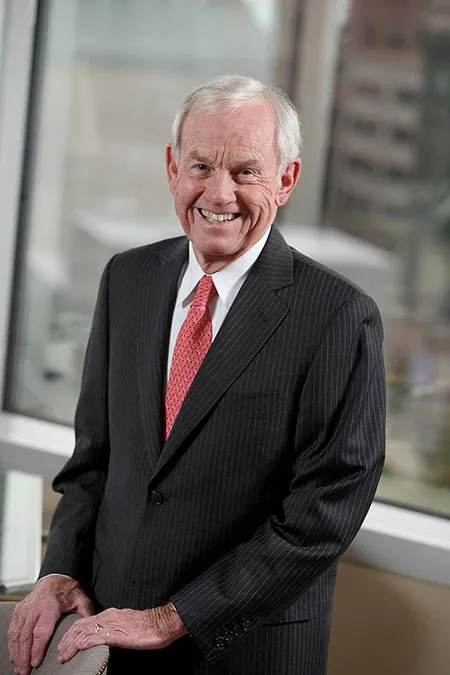A willful abuse of power puts our society in continuing peril
Articles
From the President’s Desk
View more from News & Articles or Primerus Weekly

The late Supreme Court Justice David Souter, who was appointed to the high court in 1990 by President George H.W. Bush, was a man of letters and a Rhodes scholar who cared deeply about his country and the path that it has taken over the past two decades. He said as much in a 2012 interview, some 13 years before he died on May 8 at age 85.
In particular, Justice Souter expressed concern about the future of the rule of law, judicial independence, and American democracy itself in light of the undue influence of money in politics and the public’s blindness to threats to the freedom to vote.
“I don’t believe there is any problem of American politics and American public life which is more significant today than the pervasive ignorance of the Constitution of the United States and the structure of government,” Souter said during an hour-long interview before an audience of more than 1,300 people in Concord, N.H.
The public’s seeming disdain for history and the lessons it teaches can lead to the rise of a strongman, Souter indicated.
“That is how the Roman Republic fell,” he said, referring to Augustus becoming an autocratic emperor by promising to restore old values.

“The day will come when somebody will come forward,” Souter predicted, “and we, and the government will, in effect say: ‘Take the ball and run with it. Do what you have to do.’”
Souter’s words, of course, have become prophetic and are part of a global trend where the world has found itself held hostage to the aggressive ambitions of totalitarian rulers – ruthless leaders whose power derived in part from their people’s sense of grievance, real and/or imagined.
The destructive abuse of power has been a constant worry for centuries and perhaps was best expressed by the 19th century British politician Lord Acton. In an 1887 letter, Lord Acton wrote: “Power corrupts; and absolute power corrupts absolutely,” conveying the point that, as a leader’s power increases, their moral sense diminishes accordingly.
Corruption, not surprisingly, can take place at any level as long as there is a base of willing and compliant followers. Look no further than the destructive cults fueled by such psychopathic leaders as Charles Manson and his “Helter Skelter” Manson Family, Jim Jones of the Peoples Temple, and David Koresh of the Branch Davidians.
They, in some warped sense, may have been inspired by the words and work of Adolf Hitler, the mastermind of the Nazi Party who orchestrated the Holocaust, the state-sponsored murder of more than six million European Jews between 1933-45.
Hitler consolidated his power as Germany’s chancellor by utilizing emergency decrees, violence, and intimidation to seize control of a country that had suffered a humiliating defeat in World War I and was reeling from the economic turmoil it inflicted. His government arrested political opponents or members of the press who dared criticize him or the Nazi Party, putting them in jails or concentration camps. Few were brave enough to publicly speak out, especially when they could be arrested or killed for doing so.
Now, 80 years after the end of World War II, American democracy is being put to perhaps its stiffest test, as the separation of powers doctrine is being swept aside. The constitutional restraints on executive power have given way to “presidential government” with the legislative and judicial branches rendered virtually rudderless. Many of those in Congress have abetted the actions or adopted the stance of heedless cowards by refusing to defend the U.S. Constitution despite swearing an oath to do just that.
They should be reminded of a 1956 book, “Profiles in Courage,” which was authored in part by a future American president, John F. Kennedy. The book contained a volume of short biographies describing various acts of bravery and integrity by eight U.S. senators. Those profiled defied “the opinions of their party and constituents to do what they felt was right and suffered severe criticism and losses in popularity because of their actions,” according to a promotional description of the bestseller that won the Pulitzer Prize for Biography.
If someone set out now to write a modern-day sequel, he or she would be hard-pressed to find a few, if any, members of Congress worth profiling. The reason revolves around their lack of character and conviction, and their failure to fulfill a moral duty to serve the best interests of the country. In short, they have willfully abandoned the principle that “it is never wrong to do what is right.”
Throughout history, the lesson was taught by such leaders as Abraham Lincoln, Franklin Delano Roosevelt, and Winston Churchill, whose moral fiber was on full display during World War II when he helped bring his country from the brink of defeat to eventual victory over the Nazi military machine.
Like Lincoln, Churchill set heroic standards of leadership through his mastery of language, using words to inspire a nation to overcome the rise of totalitarianism.
Now, words must translate into political action, otherwise a collective silence will allow the drumbeat of a dictatorship to dismantle government as we know it.
When can the sound of silence be lethal? When “Good People Who Happen to Be Good Lawyers” stop speaking out against conduct threatening our cherished inalienable rights of life, liberty, and the pursuit of happiness guaranteed to us by our precious Constitution.
Best regards,
Jack Buchanan, President